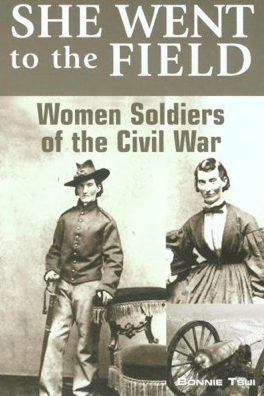Continuing in the celebration of National Women’s History Month, here is a trio of women’s firsts from the Civil War era.
Among the First Women To. . .in the Civil War are a combatant, a doctor, and an orator. All three defied the gender designations of their time and one exceeded expectations for her race as well.
The orator was Anna Elizabeth Dickinson. Renowned for her abolitionist speeches, she was the first woman to speak before Congress. Her activism began at age thirteen when she wrote an essay for The Liberator, an abolitionist newspaper in Boston. Because the Quakers did not dissuade women from speaking in public, she used their platform for her speeches. In 1861, eight hundred Philadelphians paid to hear her speak on the topic of “The Rights and Wrongs of Women.” By the time she spoke in New York, five thousand attended her speech.
She could “hold her audience spellbound for as much as two hours.” Eventually she averaged a speech every other day and earned $20,000 annually, a magnificent sum in that day. When the Republic leadership in Congress invited her to speak in 1864, the president joined military and civilian leaders in the congressional gallery to hear her speak.
The most famous of this trio is Harriet Tubman, the first woman to lead an armed expedition in the Civil War. Born into slavery, Harriet Tubman, originally Araminta Harriet Ross, escaped into Pennsylvania. “When I found I had crossed that line,” she said, “I looked at my hands to see if I was the same person. There was such a glory over everything; the sun came like gold through the trees, and over the fields, and I felt like I was in Heaven.”
The experience was so transforming that she resolved to free other slaves and led hundreds north as a “conductor” on the Underground Railroad prior to the Civil War. During the war she served as a cook and nurse, then as a scout and spy for the Union Army. The Combahee River Raid, which she led, liberated more than 700 slaves. When she died she was buried with military honors.
Because of her service in the Civil War, Mary Walker was the first woman to receive the Congressional Medal of Honor. As a doctor, she served on the battlefield in tent hospitals and was appointed assistant surgeon in the Army of the Cumberland. When she crossed enemy lines to treat soldiers on the other side, the South arrested her as a spy and made her a prisoner of war. Released after nine months, she returned to the battlefield and served in the Ohio 52nd Infantry, where she provided care for women prisoners.
In 1917 Congress changed the rules for awarding the Congressional Medal of Honor and rescinded Mary Walkers’ medal. She continued to wear it for the remaining two years of her life and President Jimmy Carter restored the award posthumously in 1977. She is still the only woman to have received this award.


Trackbacks/Pingbacks